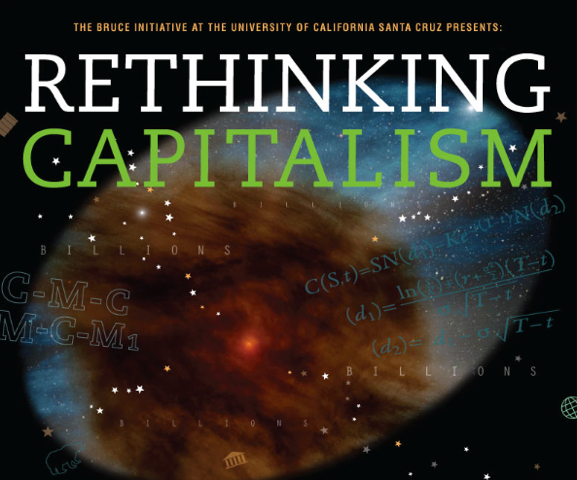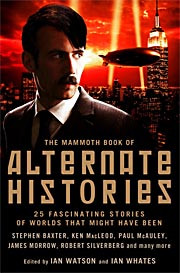Rethinking Capitalism conference
Submitted by KimonBruce Initiative on Rethinking Capitalism Conference, April 7-9, 2011 - Social Sciences Division of University of California Santa Cruz
Kim Stanley Robinson will be appearing on the 2011 Rethinking Capitalism Conference, April 7-9, 2011. There are several panels and a wide range of participants over the three-day event. The conference is described as:
The collapse of capital markets in 2008 has produced a literature that describes the financial apocalypse we almost had. This new, more realistic, view of capitalism stresses its dependence on taxpayer subsidy and government regulation and the imperative of preserving it as something less than a market utopia. This conference will explore the difference and relation between confessing the fragility of capitalism and formulating a critique. Each panel brings theories of economic value and regulation into conversation with the study of culture, institutions, ethics, history, geography and theology. Their overall focus will be on the large role of financial products, especially options, in the development of global capitalism and the ways which questions of how to manage uncertainty about the future must be supplemented by political questions about the direction and sustainability of capitalism itself.

The issues covered are very topical and a matter of hot debate in recent times. Indeed, when including some of the most respected economists of our times insist that the problem not only lies in regulation (or lack thereof) of financial markets, but also in the fact that our world civilization is hitting against real physical limits inherent in our world and its finite resources, then it is time to listen, ponder, and act accordingly!
See this recent article in the New York Times by US economist and Nobel laureate Paul Krugman (December 2010), as one example among many many:
Oil is back above $90 a barrel. Copper and cotton have hit record highs. Wheat and corn prices are way up. Over all, world commodity prices have risen by a quarter in the past six months.
So what’s the meaning of this surge?
Is it speculation run amok? Is it the result of excessive money creation, a harbinger of runaway inflation just around the corner? No and no.
What the commodity markets are telling us is that we’re living in a finite world, in which the rapid growth of emerging economies is placing pressure on limited supplies of raw materials, pushing up their prices. And America is, for the most part, just a bystander in this story.
Stan will be appearing in one of the very first panels, on Thursday April 7:
7:15 PM Keynote Panel: Telling the Story of 2008: Realistic, Utopian and Apocalyptic Narratives of What Could Have Happened
Kim Stanley Robinson, Science fiction author known for his Mars trilogy
Lynn Stout, Corporate and Securities Law, University of California Los Angeles
Graham Ward, Contextual Theology and Ethics, University of Manchester
He will also be appearing on a panel with a large number of participants on Friday April 8:
2:00 PM ROUND TABLE 1: Eschatology, Visualization and Scenario Planning
Andrew Barry, School of Geography, University of Oxford
Karin Knorr Cetina, Sociology, University of Constance, Germany
Daniel Friedman, Economics, UC Santa Cruz
Dai Jinhua, Comparative Literature and Culture, Beijing University, Resident Fellow Townsend Center for the Humanities, UC Berkeley
Andrew Mathews, Anthropology, UC Santa Cruz
Darel Paul, Political Science, Williams College
Paolo Quattrone, Accounting, IE Business School
Kim Stanley Robinson, Science fiction author known for his Mars trilogy
Shyam Sunder, Accounting, Economics and Finance, Yale University
Graham Ward, Contextual Theology and Ethics, University of Manchester
The Santa Cruz Sentinel ran an article on the conference and provides some background:
Last year's inaugural Rethinking Capitalism conference focused on derivatives, the esoteric financial instruments that helped drive the economy to the brink of failure.
"Now we're drilling down," said Stephen Bruce, founder of the Bruce Initiative. Bruce is a UCSC economics graduate who went on to a career in international asset management.
He founded the Bruce Initiative at UCSC because of its interdisciplinary approach to probing critical social and economic issues in unconventional ways.
"This year we will look at social systems and questions of distribution and allocation."
"People used to be persuaded that the problems in markets could be solved by creating more markets. Now I think people no longer expect these markets to operate without very heavy involvement from government and central banks and government can't do what they do to keep these markets going without suspending democracy. The general view is that the system has been saved but that we're on borrowed time. The purpose of the conference is really an attempt to figure out what kind of time that is."
If you are going to the conference, we are interested in any material you might come back with!
And as always, if you have an opinion or want to react on these matters, there is always the comments section below.
Edit: Thanks to Albinoflea!



